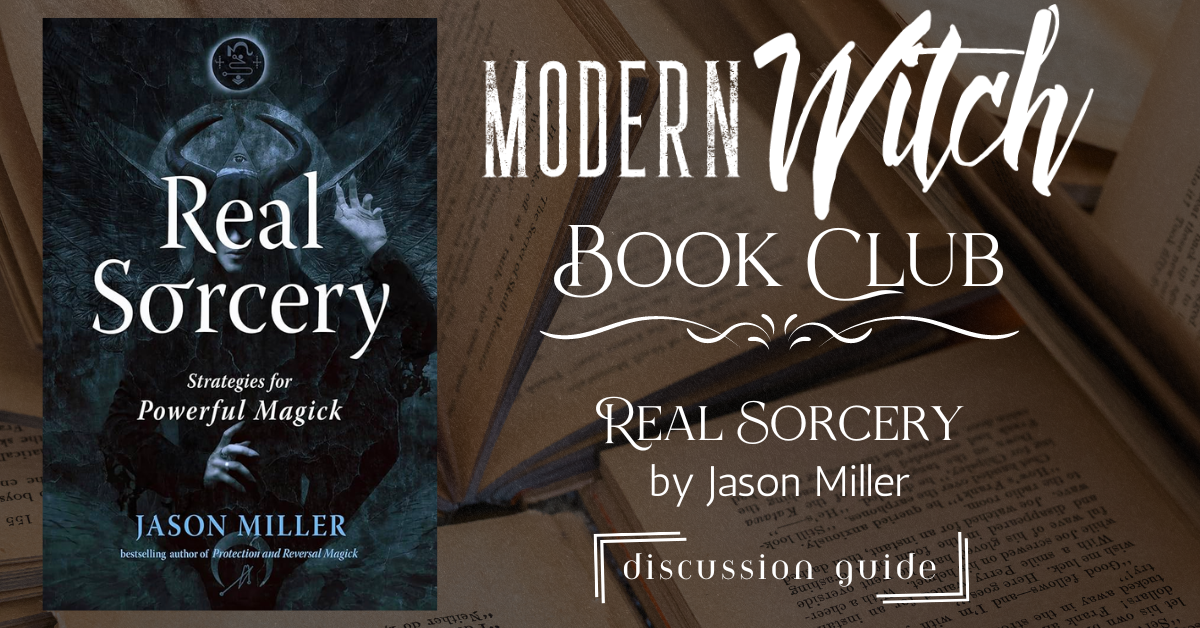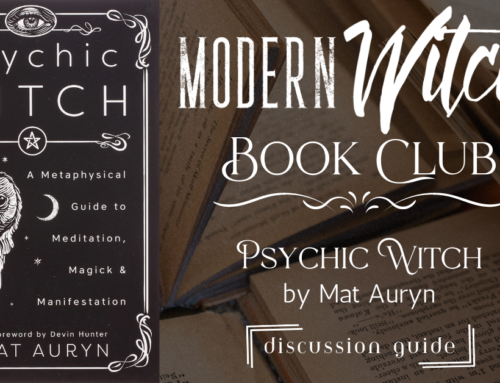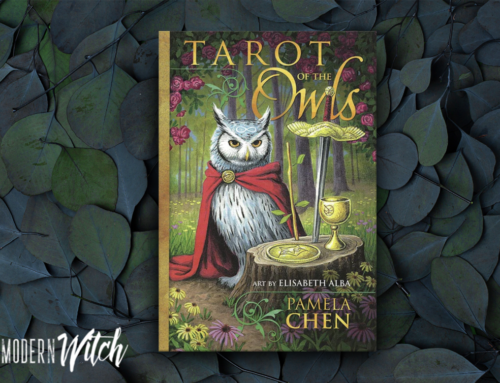Our first book for the new Modern Witch Book Club is Real Sorcery by Jason Miller.
CHAPTER ONE – THE GIFT
The anecdote about the natural healer who became a mediocre Reiki practitioner highlights the conflict between formal training and innate intuition. Discuss the balance between structured learning and following one’s intuitive gifts in magick. Share personal experiences where intuition guided you differently from formal teachings.
Jason talks about his own strengths and weaknesses in different areas of Sorcery. Discuss the concept of embracing one’s magickal strengths and accepting weaknesses. How does this approach shape your practice, and what decisions have you made regarding areas of strength versus those that challenge you?
The chapter addresses the notion that modern magick is more accessible, attracting a broader range of practitioners compared to the past where only those with a strong calling or gift pursued it. Discuss how this increased accessibility affects the depth and seriousness of magickal study. Consider the benefits and drawbacks of magick becoming mainstream and its impact on the community of practitioners. How does this inclusivity shape the future of magickal traditions and practices?
CHAPTER TWO – THE THREE LEVELS
The chapter notes the differences in magickal practices across various cultures (e.g., Tibetan magick, Hoodoo). Discuss how cultural context influences magickal systems and the importance of understanding these nuances when adopting practices from different traditions.
The New Edition Commentary introduces a seven-fold division of reality layers. How does expanding from three to seven levels alter your approach to magick? Discuss the implications of this more nuanced framework on the practice of Sorcery and the understanding of the universe.
Jason cautions against the limitations of models in understanding magick and reality. Discuss the importance of remaining open to the ineffable and unmodelable aspects of magick. How do you navigate the balance between structured magickal systems and the boundless nature of spiritual practice?
CHAPTER THREE – SUBTLE KEYS
Discuss the role and importance of incorporating subtle keys (like breaths, gazes, gestures) into daily life and non-ritualistic contexts. How do these practices enhance your overall magickal abilities and awareness?
Explore the balance between traditional magickal gestures and the creation of personal gestures in your practice. How do you decide when to adhere to traditional gestures and when to innovate, and what impacts do these choices have?
The chapter mentions the use of phrases in sacred languages (e.g., Sumerian, Latin, Sanskrit) as powerful tools. Discuss the impact of using sacred languages in your practice. How do these languages augment the power of your workings, and how do you choose which language or phrase to use in a given situation?
CHAPTER FOUR – REGULAR PRACTICE
Explore the significance of making offerings in Sorcery. How do regular offerings build relationships with spirits and enhance magickal workings? Share personal experiences where offerings have played a key role.
Reflect on how you incorporate regular magickal practices, like meditation, offerings, and invocations, into your daily routine. How do these practices enhance your skills as a Sorcerer and impact your daily life?
Considering the emphasis on meditation as a crucial discipline, share your experiences with meditation. How has meditation influenced your magickal practice and your perception of reality?
CHAPTER FIVE – DIVINATION AND INTELLIGENCE GATHERING
How do you integrate divination into your decision-making process? Share examples where divination played a key role in guiding your choices.
Discuss the balance between relying on magickal divination and gathering information through mundane means. How do you ensure a balanced approach in intelligence gathering?
Reflect on the ethical responsibilities of divination, especially when providing readings for others. How do you handle situations where divination reveals sensitive or potentially harmful information?
CHAPTER SIX – INFLUENCE AND PERSUASION
How do you navigate the ethical implications of using sorcery for influence and persuasion? Discuss instances where you may have faced ethical dilemmas in this context.
Share your experiences in using both direct and indirect influence in your sorcerous endeavors. How do you determine which approach is most appropriate for a given situation?
Discuss any limitations or risks you’ve encountered in using sorcery for influence. How have you addressed these challenges?
CHAPTER SEVEN – FINANCIAL MAGICK
How do you align your financial goals with your spiritual values?
Do you feel the pursuit of wealth be a spiritual practice in itself?
Discuss ways to maintain a healthy relationship with money in the context of financial magick.
CHAPTER EIGHT – PROTECTION & SECURITY
How can one discern between natural misfortunes and occult attacks?
Discuss the ethical considerations in employing counter magick like bindings and expulsions.
Explore the balance between maintaining magickal protection and being open to spiritual experiences and alliances.
CHAPTER NINE – LOVE & LUST
How can practitioners balance the desire for love with the need to respect individual autonomy in their magickal practices?
Explore the potential of inner love magick and self-improvement in attracting and maintaining healthy relationships.
Discuss the role of ethical considerations in modern love magick, especially in light of contemporary social issues.
CHAPTER TEN – FURTHER STRATEGIES
How do you perceive the ethical implications of influencing a legal proceeding through magick? Is there a line that should not be crossed, and if so, where is it?
How do elemental balancing and other magickal practices complement conventional medical treatments? Do you believe these practices can directly influence physical health, or do they work more on a psychological or spiritual level?
To what extent should a sorcerer take responsibility for the outcomes of their spells, especially when working for a client (or someone else)?





